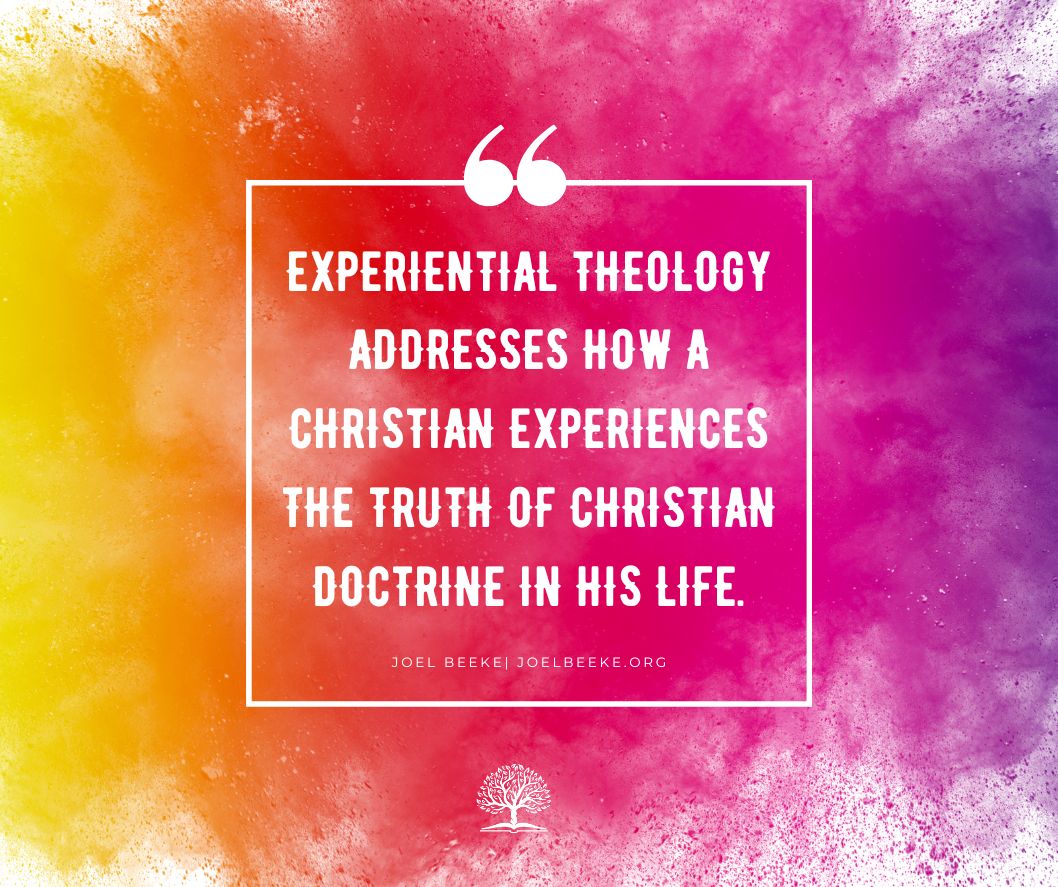Experiential or experimental theology addresses how a Christian experiences the truth of Christian doctrine in his life. The term experimental comes from the Latin experimentum, meaning “trial.” It is derived from the verb experior, meaning “to try, prove, or put to the test.” That same verb can also mean “to find or know by experience,” thus leading to the word experiential, meaning knowledge gained by experiment. John Calvin used experiential and experimental interchangeably, since both words in theology indicate the need for measuring experienced knowledge against the touchstone of Scripture.
By experiential or experimental theology, we mean Christ-centered theology which stresses that for salvation, sinners must by faith have a personal, experiential (that is, experienced) Spirit-worked knowledge of Christ, and, by extension, of all the great truths of Scripture. Thus we must emphasize, as the Puritans did, that the Holy Spirit causes the objective truths about Christ and His work to be experienced in the heart and life of sinners.
For example, our lost state and condition by nature due to our tragic fall in Adam, our dire need for Jesus Christ who merits and applies salvation by His Spirit, and our responsibility to repent and believe the gospel of God’s freely offered salvation in Jesus Christ all must be known and experienced in our lives. Experiential theology stresses that the Holy Spirit blesses man-abasing, Christ-centered theology that makes room for Christ within the soul; believers will then yearn to live wholly for His glory out of gratitude for His great salvation. John 17:3 says, “And this is life eternal, that they might know thee the only true God, and Jesus Christ, whom thou hast sent.” The gospel truth of sovereign grace that abases us to the lowest and exalts Christ to the highest in our salvation must be proclaimed and experienced.
Experiential theology is therefore applicatory. It explains how matters do go (Rom. 7:14-25) and how they ought to go in the Christian life (Rom. 8). It explains how the life of faith begins with spiritual rebirth and grows in resisting sin and in becoming Christ-like while being indwelt by the Holy Spirit. It aims to apply faith in Christ to all of the believer’s experience as an individual and in all the believer’s relationships in the family, church, and world. Such teaching addresses the mind, engages the heart, and confronts the conscience. Experiential theology is also discriminatory. It defines the difference between believers and unbelievers, opening the kingdom of heaven to believers and shutting it against unbelievers. We believe that more than historical faith (believing biblical truth and doctrine with the mind) is necessary for salvation. True saving faith (biblical doctrine and truth formed within the soul by personal knowledge of and trust in Christ alone for salvation) is essential. At minimum, a true Christian should be able to explain the basics of personal conversion, which results in experiencing the reality of the guilt of sin, deliverance in Christ, and gratitude to the Triune God for His glorious salvation.
Emphasis must be placed, then, on the necessity of being born again, repenting, and believing in Christ alone for salvation. True conversion should never be presumed in adults or children. The child growing up in the church receives the outward benefits of the covenant, but the covenant’s essence and promises must be appropriated by faith and repentance. We are opposed to an overly optimistic view of the covenant that regards covenant children as in a state of grace unless the opposite proves true later in life. Out of loving concern for children and adults, biblical marks and fruits of saving grace are expounded from Scripture to distinguish spiritual life from counterfeit Christianity.
Reformed experiential theology teaches that Christianity is not only a creed and a way of life but also an inner experience resulting from personal fellowship with God through the indwelling Spirit. Some assert that this produces an unbiblical kind of mysticism, but nothing could be further from the truth. Unbiblical mysticism separates Christian experience from the Word of God, but the historic Reformed stance demands God-glorifying, Word-centered, Spirit-worked experiential Christianity. Such Christianity produces a balanced Calvinism that does justice to all aspects of the Christian life: the intellectual, the emotional, the volitional, and the spiritual. It helps promote a comprehensive Reformed worldview. It shows us how to live in two worlds; how to have heaven before our minds to guide and shape our lives here on earth.









